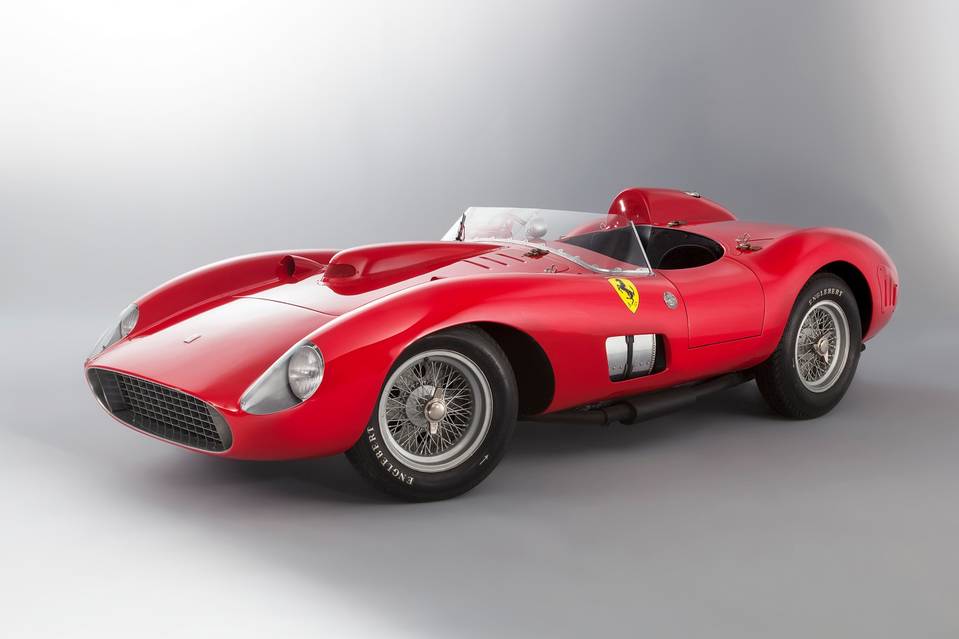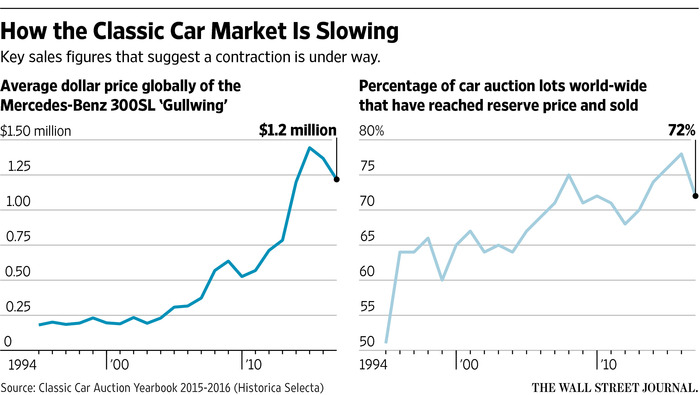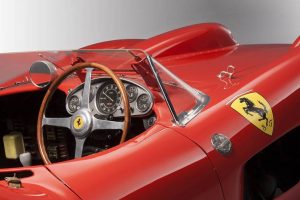Original Article – October 23, 2016 – The Wall Street Journal
Best-in-class vehicles continue to break new ground, but everyday sales are decelerating

A 1957 Ferrari 335 S Spider Scaglietti sold in February in Paris for €32.1 million ($35.2 million). PHOTO: ARTCURIAL/CHRISTIAN MARTIN
In the market for classic cars, a bend in the road is approaching.
Record-breaking prices have come at a steady pace in recent years. All 10 of the highest prices ever paid for collectible cars sold at auction have come since 2013.
The king of the road for auctions this year: a 1957 Ferrari 335 S Spider Scaglietti, which sold in February in Paris for €32.1 million ($35.2 million).
But some market watchers see signs that prices may be peaking, even for many of the most-sought-after models.
There is still growth at the high end of the market, these observers say. But it’s slowing. The HAGI Top Index, a closely watched measure of prices paid for cars that cost more than £100,000 ($122,670) and have fewer than 1,000 surviving examples, rose 7.2% this year through September—compared with a 17.6% jump during the same period the previous year, and 25.1% in the period for 2014. The index is a product of London-based Historic Automobile Group International, an independent investment research company.
Data from a broader slice of the market, meanwhile, show a more worrisome picture. Indeed, some key sales figures suggest a contraction is under way. The percentage of classic-car auction lots that meet their reserve price has fallen recently after several years of increases, according to Classic Car Auction Yearbook, a group based in Italy that examines the results of the leading global car auctions. After increasing to 78% in 2014-15, up from 68% in 2010-11, the percentage dropped to 72% in 2015-16.
Another possible signal that the market is turning, says Adolfo Orsi, co-author of the yearbook: an increasing skid in values in the broader market.
“The Mercedes 300 SL Gullwing is a good example of this,” says Mr. Orsi. “Our figures show that the average value went down about 5.3% in the 2014-2015 season compared to 2013-2014, and [fell] 11% in the last season.”

The numbers don’t portend a collapse in classic-car prices, Mr. Orsi says. He and other insiders think it’s unlikely the market is in a bubble like the one seen in the 1990s when investors who bought at the top found themselves quickly stuck with models worth only a fraction of what they paid for them. Mr. Orsi says he expects “a normal soft landing of the average market, with exceptional and rare cars still achieving record prices.”
James Knight, group motoring director at Bonhams auction house in London, says he sees the recent cooling of sales as no cause for concern. On the contrary, he says it can be a positive development.
“In the last couple of years we have seen the market slow down, which I think is not a bad thing,” Mr. Knight says. “Speculators like instability, because with volatility comes opportunity. But the average collector, driven more by the heart than the commercial aspect, they want nice gentle growth,” not something that is “overheating.”
“It’s not a bubble,” says Mr. Knight, “it’s more like a pressure cooker with a release valve.”

1957 Ferrari 335 S Spider Scaglietti PHOTO: BOURNEMOUTH/REX SHUTTERSTOCK/ZUMA PRESS
The classic-car market is unique, he adds, because the vast majority of owners see the cars as assets they want to use, not investments that need to be unloaded at the first sign of a market turn.
“Collecting classic cars is primarily a hobby,” says Mr. Knight. People are in this market “primarily because they like owning cars, often going racing or rallying, or just driving for the pleasure of it,” he explains. “If I was into sailing, I’d know that it was never going to be a moneymaking exercise, it would all be about the enjoyment.” Of course, he adds, “cars have the added benefit that you can actually make some money as well.”
If you are hoping to make a profit when you sell, there is a simple approach that will maximize your chances, Mr. Knight says. “Look for the holy trinity: condition, originality and provenance.”
Tonnie Van der Velden, car specialist at RM Sotheby’s Europe, advises collectors to always buy cars in the best condition possible. Restorations often cost far more than a car in excellent condition, he says.
But Mr. Van der Velden agrees that people shouldn’t think too much about collectible cars as financial investments. “They’re not like stocks,” he says. “People choose cars because they are investing in pleasure.”
Scott Grundfor Company has a wealth of experience and expertise in all facets of the classic car market, specializing in high-end collectibles and vintage Mercedes-Benz 300SL Gullwings and Roadsters.
Read about our Classic Car Collection Consultation Services or Contact Us for personalized expert advice.



